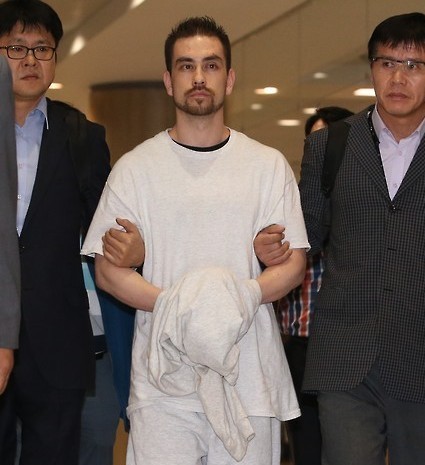- California Assembly OKs highest minimum wage in nation
- S. Korea unveils first graphic cigarette warnings
- US joins with South Korea, Japan in bid to deter North Korea
- LPGA golfer Chun In-gee finally back in action
- S. Korea won’t be top seed in final World Cup qualification round
- US men’s soccer misses 2nd straight Olympics
- US back on track in qualifying with 4-0 win over Guatemala
- High-intensity workout injuries spawn cottage industry
- CDC expands range of Zika mosquitoes into parts of Northeast
- Who knew? ‘The Walking Dead’ is helping families connect
‘Itaewon murder’ suspect extradited to Seoul

American citizen Arthur Patterson accused of murdering a South Korean college student in 1997 is extradited to South Korea at Incheon airport, west of Seoul, on Sept. 23, 2015. He is suspected of stabbing a college student, identified by his surname Cho, multiple times at a Burger King in the popular foreigner district of Itaewon in central Seoul. (Yonhap)
By Kim Se-jeong
A U.S. citizen accused of murdering a Korean college student in 1997 has been extradited to Seoul, officials said.
The Ministry of Justice said Arthur Patterson, 35, who is suspected of stabbing the student, Cho Joong-pil, 22, multiple times at a Burger King outlet in Itaewon in central Seoul 18 years ago, arrived at Incheon International Airport Wednesday.
Patterson was handed over to five Korean officials on Monday (local time).
At the time of the incident, Partterson was in Korea as a dependent of the U.S. military’s civilian worker and his Korean wife.
The prosecution initially concluded his friend, a Korean American Edward Lee, was the offender and indicted Lee only. It said at that time that Patterson was at the crime scene, but it was Lee who stabbed Cho in his neck and chest nine times.
But a local court acquitted Lee of the charges, and the Supreme Court in 1999 upheld the lower court’s verdict, citing insufficient evidence.
Patterson was under another trial, but fled the country in August 1999 when the law enforcement authorities failed to extend his overseas travel ban.
The case remained closed for 10 years until 2009 when a film “The Case of the Itaewon Homicide” rekindled public outrage. The movie’s popularity prompted prosecutors to reopen the case, and the prosecution pointed Patterson as the real perpetrator.
Patterson was detained in the U.S. in May 2011, but he has been fighting extradition by submitting multiple habeas corpus petitions, the ministry said. In November that year, the Korean prosecution indicted him for the murder and set in motion the extradition process.
In 2012, a U.S. federal court judge ordered Patterson’s extradition to Korea, but he appealed. In May, the U.S. Court of Appeals for the Ninth Circuit affirmed the lower court’s decision.
Patterson will be transferred to Seoul Detention Center before standing trial. Under local law, a Korean lawyer has been assigned to defend him.
A ministry official said the extradition is the most dramatic in the history of U.S.-Korea collaboration.
“The extradition will be a chance to solve the mystery of the case, which has remained unsolved for nearly two decades. We hope the trial will resolve the deep sorrow of the victim’s family,” he said.












![일본 사도광산 [서경덕 교수 제공. 재판매 및 DB 금지]](http://www.koreatimesus.com/wp-content/uploads/2024/07/PYH2024072610800050400_P4-copy-120x134.jpg)



Pingback: International Clinic In Itaewon Korea | center - best medical center